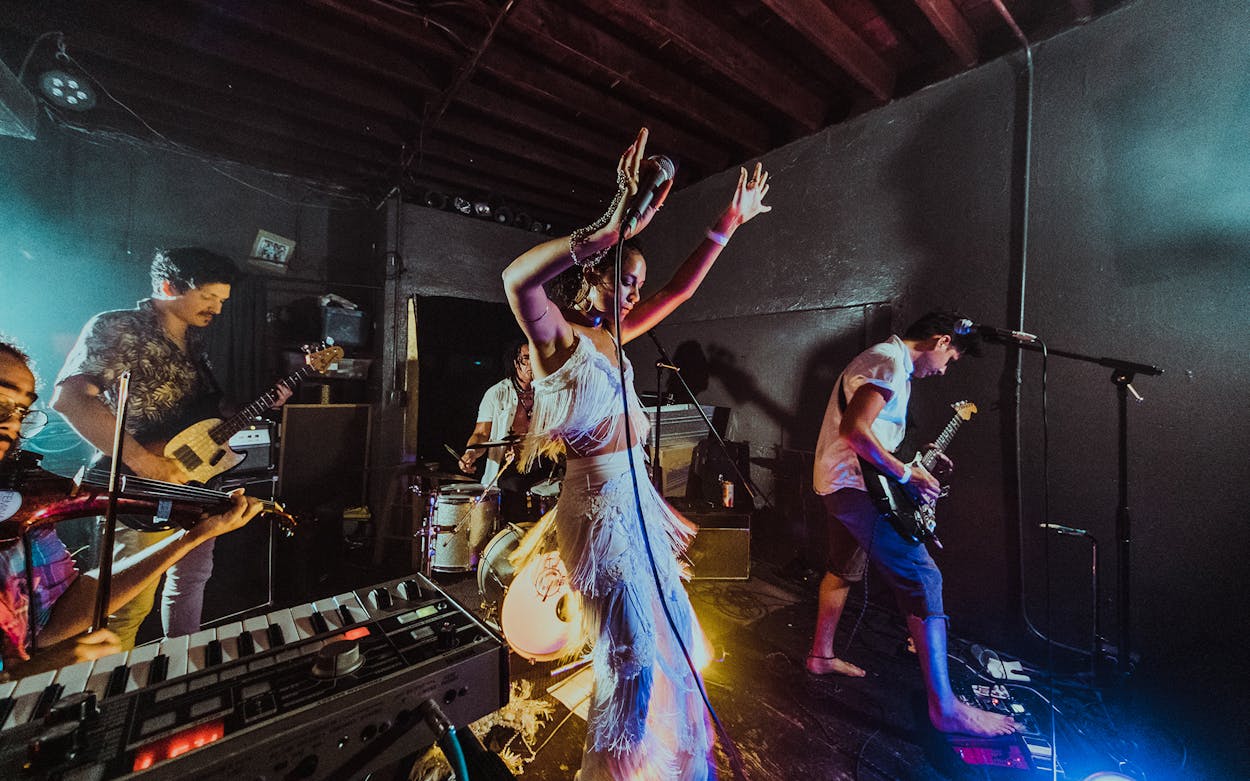This article is part of our November 2017 issue, which features a comprehensive look at Texas music.
Around nine-thirty on a Friday evening last summer, three of the five members of the experimental electronic-rock act Femina-X gathered around a picnic table on the expansive back patio of the music club Ventura, perched above the northern, museum-area stretch of the San Antonio River Walk. Daniela Riojas, the band’s 28-year-old vocalist and undisputed leader, who wore a fringed, midriff-baring white halter top with matching Selena-style pants, described to me how she founded the band three years ago with guitarist Alex Scheel. “We were in a relationship at the time and just started making songs together,” she said. Thirty-two-year-old Scheel, in a short-sleeve button-down shirt and cut-off jean shorts, jumped in. “There’s not many people in San Antonio who you can bounce off ideas about electronic music or avant-garde music.” Riojas and Scheel share a love of electronic acts like Massive Attack, Aphex Twin, and Goldie—a rare bond, since the local music scene at the time was dominated by punk, grunge, and metal (the latter an enduring legacy from the seventies, when San Antonio radio station KMAC/KISS helped AC/DC, Rush, and Judas Priest break onto the national scene). That’s all changed, they said. “These days, pretty much any band can play any club,” Scheel observed. “It’s not, there’s all heavy metal in this space and all punk in that space. Now it’s like, if you’ve got the energy, come on in.”
It was a big weekend for the ramshackle club Ventura. Although the spot had been a live music venue for as long as anyone could remember, it was celebrating its first anniversary under the ownership of Michael Carrillo, a 28-year-old singer who had started working there in 2008 as a sound engineer, back when it was a punk venue called the Ten Eleven. Carrillo purchased the club, installed central air, velvet couches, and chandeliers, and renamed it after his indie rock band’s 2011 debut EP, Deer Vibes. With its location just a five-minute drive from the St. Mary’s Strip—the current epicenter of the San Antonio live music scene—Ventura was perfectly poised to ride the wave of new music coming out of what is now the state’s second-biggest city.
Nearly as significant as the anniversary was the fact that Ventura had recently received a full liquor license from the TABC. So in June, Carrillo decided to celebrate his success by throwing a two-day party at Ventura and inviting all his friends, who happen to include almost anyone worth knowing in the San Antonio music scene. In attendance were members of many local acts and at least one DJ from Trinity University’s radio station, KRTU, which often features local musicians. Four bands were scheduled to perform the first night, ending with Femina-X. And although Femina-X’s set wouldn’t begin for another few hours, most of its members were already at the club to support the other bands on the bill: four-piece rock band Orsinger, experimental instrumentalist group Verisimilitude, and Lonely Horse, which sounds like a cross between Led Zeppelin and Neutral Milk Hotel. Everyone seemed to know everyone else. When Carrillo stopped by to say hello, those at the table congratulated him on the club’s anniversary. “We’re so happy for you, Mikey!” Riojas said.
She leaned back in her chair and ruminated over the ways the scene had grown to accept Femina-X. One of the group’s early gigs was a punk showcase at the cramped dive bar Limelight. “We didn’t fit in very well,” Riojas said. “Everyone was expecting something to fit in more with the punk scene, but to me, it felt more punk rock to play electronic music at a punk rock venue than to play punk rock at a punk rock venue.”
As Scheel nursed a Dos Equis, he talked about how their music writing, too, has changed. Although they still, at times, compose music electronically, they’ve always performed and rehearsed as a full band, combining live instruments with electronics. When Femina-X coalesced into its current lineup of bassist Jeff Palacios, violinist Darian Thomas, and drummer Jai Roots, the band pulled away from the electronic components toward a more organic live sound favoring the texture of Thomas’s strings. Playing live freed them from a prerecorded beat, allowing for more spontaneity. Also, over time, members of the band have drawn more from their Hispanic roots. “Growing up,” Palacios said, “it was like, ‘Don’t speak Spanish, don’t sound like a Mexican.’” But the days of hiding their backgrounds are over. “Every song has a little of that Latin rhythm to it, rather than just a straight beat,” he said. “We have it, so we might as well use it to help people move. I’d rather have people dancing at a show than just contemplating it.”
A few hours later, the band took the stage to a big round of applause from the expectant crowd. The performance began like a séance, with Palacios chanting over a violin drone and thundering drumbeats. Suddenly they launched into their set, Riojas mesmerizing the crowd with her soaring vocals, her white fringe outfit glowing violet from the stage lights. The crowd, which had been scattered around the club, gravitated to the stage to watch what was clearly the most anticipated show of the night. An intense, sweat-soaked hour later, Femina-X concluded their set with a rousing cover of “Volver, Volver,” the 1976 hit song by the King of Ranchera Music, Vincente Fernández, and they brought the song to its crashing conclusion, with the audience whooping and hollering.
- More About:
- Music
- San Antonio









